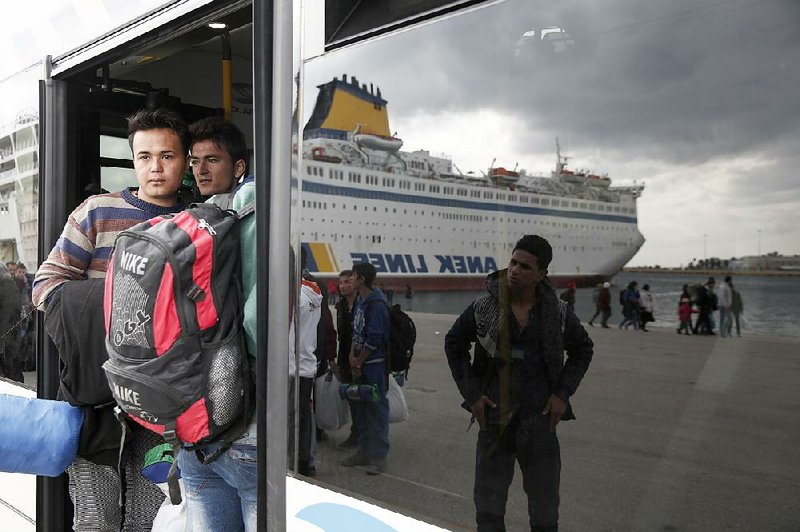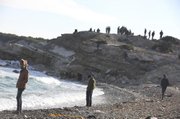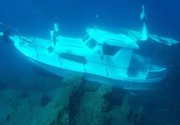ATHENS, Greece -- A plastic boat carrying migrants from Turkey capsized and sank Sunday off the Greek island of Samos in high winds, killing 11 people, including six children, according to Greek officials.
Another four bodies were pulled out of the sea off the small island of Farmakonissi, south of Samos, a few hours later, and seven migrants were found dead off the island of Lesbos, according to a Greek Shipping Ministry official. The seven bodies could be from a large wreck Wednesday in which more than 20 people died, according to the official, who spoke on condition of anonymity.
"We had several rescue operations today in several parts of the Aegean," the official said.
About 9 a.m. Sunday, a plastic boat flipped over in near-gale-force winds about 25 yards from the coastline of Samos. Rescuers recovered the body of a woman from nearby rocks, and divers found another 10 people trapped in the cabin of the sunken boat, the official said.
"There were four women in there, as well as two children and four babies," she said, adding that 15 people were rescued. Winds were still strong at noon when the four bodies were found near Farmakonissi.
Because of the strong winds, the Greek coast guard ordered vessels to remain anchored in many ports across the country Sunday.
The bad weather has not discouraged migrants from risking the short but dangerous sea crossing from Turkey to Greece. More than 60 people, nearly half of them children, have died in the past week after their boats sank in choppy waters.
Largely because of the proximity of Turkey's coastline to Greek islands in the Aegean Sea, Greece remains a favored entry point into Europe for thousands of people fleeing war or seeking a better life.
More than a half-million people have arrived in Greece so far this year. A handful of islands in the eastern Aegean, including Lesbos and Samos, have borne the brunt of the influx. Lesbos has been particularly overwhelmed, with more than 300,000 landing on the island this year, nearly four times the island's population.
Most migrants arriving in Greece are keen to leave the country, which remains mired in a deep financial crisis, and to continue their journeys to more prosperous nations in Western and Northern Europe. But they face further trials on the way as Balkan and European nations on their route have intensified border controls or erected fences.
In Greece, a wire fence set up along the country's land border with Turkey in 2012 to discourage migrants from sneaking into the country has become the focus of protests. Hundreds of members of leftist and human-rights groups gathered at the border Saturday, calling for Greek authorities to remove the fence and offer migrants "safe passage" through the land border so they do not risk the hazardous journey by sea.
Greece's migration minister, Yiannis Mouzalas, told Greek television on Saturday that the fence cannot be taken down for "technical reasons" but expressed fears that large numbers of refugees could become "trapped" in Greece.
In a speech Friday in Parliament, Prime Minister Alexis Tsipras railed against European leaders for "passing the buck" on a solution for the refugee crisis and "putting up fences and barbed wire."
Talks in Germany
Elsewhere in Europe, German Chancellor Angela Merkel's weekend talks with fellow party leaders failed to result in a common coalition stance on tackling the refugees crisis, risking further discord over her handling of the biggest influx of migrants since World War II.
Just back from a two-day trip to China, where the strain of the spiraling turmoil began to show, Merkel met Saturday evening with Horst Seehofer, the Bavarian state premier, who has demanded she stem the flow of as many as a million people into Germany this year. The two then convened Sunday with Social Democratic Party leader Sigmar Gabriel, who opposes caps on refugees.
The coalition leaders discussed all aspects of the situation in what Steffen Seibert, Merkel's chief spokesman, said were "constructive" talks. While there was agreement on many points, issues remain open, and the three party heads will meet again to discuss the crisis further on Thursday, Seibert said in an emailed statement.
Merkel's chief critic has been Seehofer, who heads the Christian Democratic Union's Bavarian sister party. Bavaria is the main entrance point to Germany for the refugees pouring over the border from Austria.
Seehofer said the Bavarian state government would take unspecified action if Merkel didn't meet his demands by Sunday to curb the number of migrants. Merkel has rejected caps on asylum seekers.
Elsewhere in Germany, violence against Syrian asylum seekers spiked over the weekend, with police Sunday reporting three different attacks in which six Syrian refugees had to be treated for injuries in hospitals.
Two of the attacks, in Wismar and Magdeburg, were committed by groups of at least 20 people who harassed and beat asylum seekers with baseball bats on Saturday.
Police in Rostock said in a statement Sunday that two Syrian men, who were not identified, were standing outside their shelter in Wismar on the Baltic Sea on Saturday night when a group of 20 people approached them and started beating the refugees. The attackers fled, and the two asylum seekers had to be taken to a hospital to be treated for injuries.
In Magdeburg, 30 people beat up two 26-year-olds and a 35-year-old Syrian man, all three of whom had to be treated at a hospital. Police detained one 24-year-old suspect.
In a third attack, a 26-year-old Syrian man was injured by pieces of glass when explosives were thrown against the window of his room in an asylum shelter in Freital in the eastern state of Saxony. The interior minister of Saxony, Markus Ulbig, sharply condemned the "cowardly and cold-blooded attack" and said a far-right motive was likely, the German news agency dpa reported.
In Sehnde, near Hannover, a 43-year-old man was detained in an arson attack on a home of an asylum seeking family from Montenegro early Sunday. Nobody was harmed in the attack.
Several arson attacks were also reported on buildings across Germany that officials plan to convert into asylum shelters, among them an empty hotel in Dresden and a former youth club in Castrop-Rauxel in western Germany.
Attacks against asylum seekers and migrant shelters have increased sharply in Germany in recent months as migrants surge into Europe, many seeking to escape war and poverty and start a new life.
Germany's interior ministry said last week that there had been 576 crimes against refugee shelters so far this year, compared with 198 in all of last year.
Information for this article was contributed by Niki Kitsantonis of The New York Times, Arne Delfs and Patrick Donahue of Bloomberg News, and Kirsten Grieshaber of The Associated Press.
A Section on 11/02/2015



